กระบวนทัศน์ใหม่การบริหารจัดการวัดในยุคโลกาภิวัตน์
Keywords:
กระบวนทัศน์ใหม่, บริหารจัดการ, ยุคโลกาภิวัตน์, New Paradigm, Management, Age of GlobalizationAbstract
การวิจัยในครั้งนี้มีวัตถุประสงค์เพื่อศึกษา 1) โครงสร้างของวัด 2) การบริหารงานของพระสังฆา- ธิการ 3) ปัจจัยที่ส่งผลต่อการบริหารจัดการวัด และ 4) กระบวนทัศน์ใหม่การบริหารจัดการวัดในยุคโลกา- ภิวัตน์ โดยการผสมผสานวิธีวิจัยเชิงคุณภาพและ วิธีวิจัยเชิงปริมาณ ใช้ระเบียบวิธีวิจัยเชิงคุณภาพเป็น หลัก การวิจัยเชิงคุณภาพดำเนินการโดยการสัมภาษณ์ เชิงลึกผู้บริหารจัดการดูแลวัดที่สังกัดอยู่ จำนวน 24 รูป/ คน วิเคราะห์ข้อมูลด้วยการวิเคราะห์เชิงเนื้อหาประกอบ ด้วยการแปลความ การตีความ และการวิเคราะห์ การวิจัยเชิงปริมาณ ดำเนินการโดยใช้แบบสอบถาม เก็บข้อมูลจากข้าราชการในสำนักงานพระพุทธศาสนา แห่งชาติ และพระภิกษุสามเณรในจังหวัดนครสวรรค์ และจังหวัดพิจิตร จำนวน 375 รูป/คน ซึ่งเลือกจาก กลุ่มประชากร จำนวน 6000 รูป/คน คำนวณจากสูตร ของทาโร ยามาเน่ และเลือกกลุ่มตัวอย่างโดยการ สุ่มตัวอย่างอย่างง่าย วิเคราะห์ข้อมูลด้วยสถิติร้อยละ ค่าเฉลี่ย ค่าส่วนเบี่ยงเบนมาตรฐาน และการวิเคราะห์ ถดถอยพหุคูณ
ผลการศึกษาพบว่า
1) โครงสร้างของวัด มีการบริหารจัดการวัด ไว้อย่างเป็นระบบ มีการบังคับบัญชาที่ชัดเจน มีระบบ การดูแลรักษาความปลอดภัยอย่างมั่นคงถาวร และมี การใช้ประโยชน์ที่ดินภายในวัดอย่างคุ้มค่า
2) การบริหารงานของพระสังฆาธิการ ปฏิบัติ ตามภารกิจของพระพุทธศาสนาได้อย่างสมบูรณ์แบบ ในการช่วยส่งเสริมทำนุบำรุงพระพุทธศาสนาให้เจริญ รุ่งเรือง
3) ปัจจัยที่ส่งผลต่อการบริหารจัดการวัด ประกอบไปด้วยกิจการหลายด้านที่ต้องมีความสัมพันธ์ เชื่อมโยงกันและเหมาะสมกับยุคสมัยอยู่ตลอดเวลา มีอิทธิพลต่อกระบวนทัศน์ใหม่การบริหารจัดการวัด อย่างมีนัยสำคัญทางสถิติที่ระดับ .01 สามารถรวมกัน พยากรณ์กระบวนทัศน์ใหม่การบริหารจัดการวัดได้ร้อย ละ 87.00 (R2 = .870)
4) กระบวนทัศน์ใหม่การบริหารจัดการวัด ในยุคโลกาภิวัตน์ประกอบด้วยองค์ประกอบหลัก 5 ประเด็นคือ 1) วัดต้องเป็นสถานที่ทำหน้าที่ฝึกอบรม พระสงฆ์รวมทั้งเยาวชนในชุมชนให้ทำหน้าที่สืบสาน พระพุทธศาสนาและสร้างความดีงามให้กับชุมชน 2) พระสงฆ์ในยุคโลกาภิวัตน์ต้องเป็นผู้นำชุมชนที่เข้าถึง ประชาชนและมีส่วนร่วมในกิจกรรมการพัฒนาชุมชนต่าง ๆ 3) วัดต้องเป็นสถานที่พึ่งพิงของประชาชนเมื่อ เกิดเรื่องทุกข์ร้อนใจ 4) วัดต้องเป็นแบบอย่างด้านการ ปกครองในระบอบประชาธิปไตยที่สามารถสร้างความ สุข สงบ สามัคคีให้กับชุมชนได้อย่างแท้จริง และ 5) วัดต้องเป็นสถานที่ปราศจากอบายมุขทั้งปวง และมี ส่วนร่วมในการรณรงค์ให้ประชาชนในชุมชน ลด ละ เลิกอบายมุขต่าง ๆ
The New Paradigm of Temple Management in the Age of Globalization
The purposes of this research were to study: 1) to study the structure of temple, 2) to study the management of the Buddhist ecclesiastical monks, 3) to study the temple management, and 4) to propose the new paradigm of temple management in the age of globalization. This research was a mixed methods research which combined both qualitative and quantitative approaches. The qualitative research was conducted by interviewing the temple administrators in responsible at the number of 24 persons. The data were analyzed by the content analysis comprising translation, interpretation and analysis. The quantitative research was conducted by gathering the data form the sample of 375 respondents who were officials in National Buddhist offices in Nakhon Sawan and Phichit provinces from the population of 6000 persons which the sample size was calculated by Taro Yamane’s formula and selected by simple random sampling. The data were analyzed by using the statistics consisted of percentage, mean, standard deviation, and multiple regression.
The results were as follows:
1) The structure of the temple had systematical management included having clear commanding system and having secure system of religious property preservation, and the land of the temple was utilized worthily.
2) The management of Buddhist ecclesiastical monks had performed the Buddhist missions perfectly in helping Buddhist preservation.
3) The factors affecting temple management consisted of various activities which had to interact with each other and always cope with modern era. These factors correlated significantly at a level of .01 and could help predict the new paradigm of the temple management 87.0 percent (R2=.870).
4) The new paradigm of the temple management in the age of globalization composed of five components comprising being (1) the temple should be learning center for local people and monks to preserve Buddhism and create virtue to the community, (2) the globalized Buddhist monks should be close to the people and participate in at various development activities, (3) the temple should be the rest-area of mind for the people whenever they have mind frustration, (4) the temple should be prototype of democratic model for the people to exaggerate happiness, calmness and unity to all people and (5) the temple should be clean off vices and promote the cleanliness to the people in the community to reduce, devote and give up all vices.
Downloads
How to Cite
Issue
Section
License
"บทความวิชาการในวารสารฉบับนี้ ถือเป็นความรับผิดชอบของผู้เขียนเท่านั้น"
สงวนลิขสิทธิ์ตามพระราชบัญญัติลิขสิทธิ์




